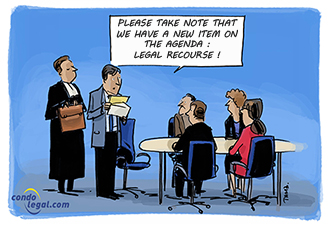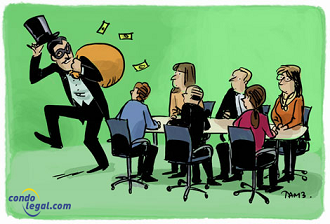
A co-ownership (condominium) is exposed to a variety of risks such as fires, water damages, theft and vandalism acts; among these risks, one that is often overlooked is fraud. The people able to commit fraudulent acts pass sometimes as unsuspected; it may be the case of the director, the co-owner, the condo manager, the service providers and third party members. Given these risks, it is imperative to implement control measures and financial vigilance to detect and prevent any attempt at fraud within the co-ownership.
Nature of frauds
Most frauds committed in co-ownerships are the result of accounting or financial manipulations; these are sometimes perpetrated by a director who commits such larceny directly from the syndicate of co-owners' bank account or engages in other malicious activities such as the falsification of signatures or even the deposits of the common expenses (condo fees) paid by the co-owners in his personal bank account. Fraud may also occur from the manager depositing funds of the co-ownership in the bank account of another syndicate.
Service providers may also commit fraud by padding their invoices; such schemes are generally intended to pay an undue advantage to one of the directors or to the manager. Furthermore, in order to renovate his dwelling, a co-owner may file an insurance claim for a loss he purposely caused; some co-owners will even aggravate the extent of the loss to increase the scope of the work.
Warning signs
The warning signs of a potential co-ownership fraud are well documented; the director or the manager could:
Limiting risks
Having an approach focused on prevention is the key to avoid a potential fraud within the co-ownership. For example, it is highly recommended to consult the civil and criminal court records of an applicant manager or director; available at the court offices or online, they will reveal the judicial track record as well as the reasons he or she had to confront a judge.
Legislation required
Unlike other jurisdictions, Quebec still doesn't have a law that protects co-ownership funds so fraudulent individuals may cause considerable financial harm.
Quebec order of chartered directors
A manager who has access to a syndicate’s bank account as a signatory or who manages funds of a co-ownership from his own bank account should be a member of the Quebec order of chartered directors (Ordre des administrateurs agréés du Québec); all of its members are subject to a ethics code and must carry professional liability insurance as well as operate from a trust account which will considerably limit the syndicate’s risk of being a fraud victim.
This professional order has set up an indemnity fund providing compensation to legal or natural people as well as to any other third party member victimized by one of its members; this occurs when a malicious person uses funds for another purpose than that originally intended.
 WHAT YOU SHOULD KNOW! The court may, at the request of any interested person, prohibit the exercise of the function of director of a syndicate of co-owners to any person found guilty of a criminal offence involving fraud or dishonesty in a matter related to legal people.
WHAT YOU SHOULD KNOW! The court may, at the request of any interested person, prohibit the exercise of the function of director of a syndicate of co-owners to any person found guilty of a criminal offence involving fraud or dishonesty in a matter related to legal people.
 WHAT TO KEEP IN MIND: In order to avoid the potentially harmful consequences of their wrongdoing, all managers should carry professional liability insurance covering their civil liability.
WHAT TO KEEP IN MIND: In order to avoid the potentially harmful consequences of their wrongdoing, all managers should carry professional liability insurance covering their civil liability.
 WARNING! Every syndicate of co-owners can be a victim of fraud and this is why it's important to be aware of the warning signs.
WARNING! Every syndicate of co-owners can be a victim of fraud and this is why it's important to be aware of the warning signs.







